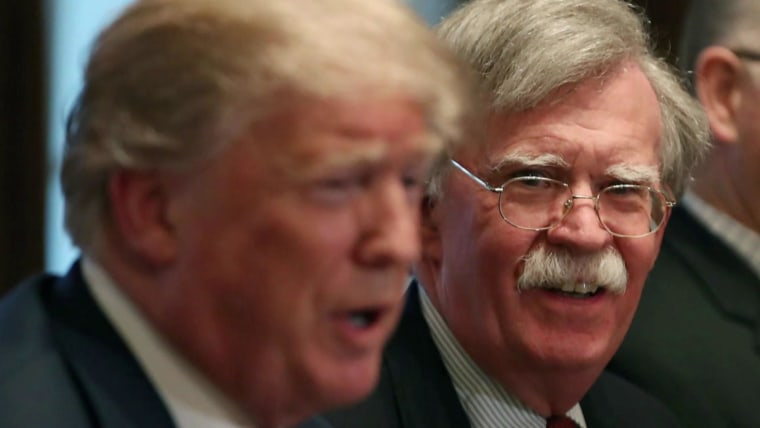On Tuesday, President Donald Trump sued John Bolton — his own former national security adviser — in a belated and clumsy effort to block the release of Bolton’s forthcoming book, “The Room Where It Happened.” The book is a memoir of Bolton’s time in the White House that, in its publisher’s words, will be the “most comprehensive and substantial account of the Trump Administration,” and an inside look at a “President addicted to chaos, who embraced our enemies and spurned our friends, and was deeply suspicious of his own government.”
The book is a memoir of Bolton’s time in the White House that, in its publisher’s words, will be the “most comprehensive and substantial account of the Trump Administration.”
The half-hearted effort to block the book’s release (an effort that, tellingly, has not sought to block the publisher from distributing the monograph) is predicated on the Department of Justice’s assertion that the book contains significant amounts of classified national security information. This is distinct from the more conventional claim that, classified or not, the book reveals information Bolton agreed not to make public as a condition of his government employment.
Want more articles like this? Follow THINK on Instagram to get updates on the week’s most important political analysis
In the government’s view, releasing Bolton’s book to the public before it has completed “prepublication review” (which is required whenever a current or a former government employee writes on a topic involving sensitive information) would be a breach of the agreements Bolton signed in order to have access to that information in the first place.
Bolton, for his part, claims that he already went to great lengths to remove any classified information from the manuscript, and that the government now is merely trying to protect Trump from the damaging, nonclassified information by abusing the notoriously subjective prepublication review process. And Trump, for what it’s worth, has responded to this dispute by publicly claiming that every conversation with him is classified.
It’s all a big mess, but the bigger mess is the ridiculous state of the law governing national security classification more generally. The law that may actually favor Trump in this dispute, but regardless of the outcome of this particular case, is in desperate need of congressional reform.
Although some degree of government secrecy dates all the way back to the founding of America (the Senate, for instance, deliberated in secret until December 1795), the modern terminology of “classified” information dates only to World War II. It was focused, from the get-go, on the protection of national security secrets — information that, were it to become public, could be used to cause tangible harm to the United States or a tangible benefit to a foreign power.
Executive Order 10290, signed by President Harry Truman in September 1951, was the first comprehensive effort to set out a framework for which information can properly be classified — and by whom. And every subsequent president has issued his own superseding executive order to govern national security classification, except Presidents Lyndon B. Johnson and Trump. The current classification scheme is governed by Executive Order 13526, which President Barack Obama signed in December 2009.
But whereas the executive branch has been an active participant in regularly updating the law governing national security classification, Congress has mostly avoided the issue. Although Congress claimed a role for itself in legislating classification standards in a host of post-World War II statutes like the Atomic Energy Act of 1954, it has, for decades, largely left the law governing national security classification entirely to the executive branch. The executive branch, in turn, has increasingly claimed that its authority derives primarily from the Constitution, and therefore cannot be circumscribed by Congress — which has stopped trying anyway.
Whereas the executive branch has been an active participant in regularly updating the law governing national security classification, Congress has mostly avoided the issue.
In the process, the executive branch has used these executive orders to impose substantive and procedural constraints on when information can appropriately be classified (“because the President said it” is not one of the categories) — and has pursued declassification of wrongly classified or stale information with varying degrees of vigor. Many of these measures have looked meaningful on paper. The problem is that the enforcement mechanisms are generally toothless. To illustrate the point, the only “penalty” the government incurs when information is incorrectly or inappropriately classified is that the information is … declassified. This is the same result as if it had never been classified in the first place, just years (and significant litigation costs) later.
As a result, the incentive to instinctively over-classify is obvious, and the resulting epidemic of overclassification has been well (and widely) documented. And although Congress attempted to push back against an epidemic of overclassification in a 2010 statute ambitiously named the Reducing Over-Classification Act, it neglected (among other things) to define what “over-classification” even is. Thus lawmakers left it to the executive branch to identify the precise contours of the problem for which it was solely responsible.
Worse still, in criminal prosecutions for wrongly possessing or leaking classified information, courts have rejected the availability of an “improper classification” defense. And the executive branch has increasingly claimed the power to “retroactively” classify information — to take information that was, for a time, in the public domain, and remove it.
Simply put, whether information is properly or improperly classified is, in almost all cases, a determination made by the very arm of the government that made the initial classification decision. And although some administrations have made more of an effort to reduce overclassification than others, the structural imbalance has persisted.
All of this goes to show why, even if a reasonable person might find no information in Bolton’s book that could have been properly classified under the governing executive order, the mere fact that the executive branch claims otherwise dramatically complicates matters. Indeed, courts have been notoriously reluctant to second-guess White House classification decisions — especially in the absence of legislation expressly commanding them to do so.
That’s why the right answer here is for Congress to reclaim authority it used to exercise — to legislate standards for national security classification and declassification, and to provide clear pathways for courts to resolve disputes arising out of claims of wrongful classification.
Bolton himself may not need such a reform; because the government is not suing his publisher, his book is likely to make it onto store shelves one way or the other. But a system in which the president can claim that anything he says is classified, and in which it’s not obvious how anyone could obtain a legal judgment to the contrary, is a system ripe for abuse regardless of who that president is.
Related:













